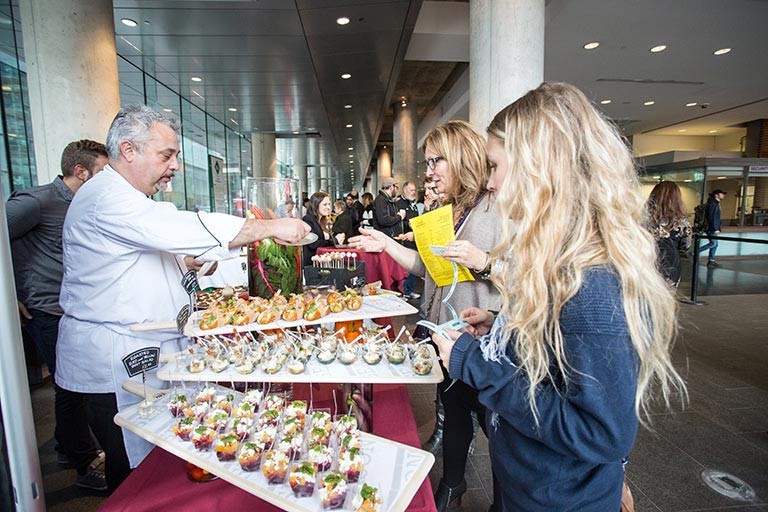Expanding Choice and sustainability

If the goal of any retail operator is to provide a greater array of choice and convenience for customers, Concordia’s Budget Planning and Business Development unit came through the 2015-16 year with flying colours—and huge developments to the way the university does business, both online and behind the scenes.
e-commerce : one stop shopping for Concordians
The unit’s showpiece was undoubtedly its rollout of an e-commerce platform that collects in one place on the net a wide variety of services that students used to only be able to access in person.
“It’s more than just the bookstore,” says Sabrina Lavoie, executive director, Budget Planning and Business Development. “It’s all of our service offerings including printing—let’s say you want to load money on your card to print throughout the university. Or you want to buy Stingers tickets. Or you want to get a gym membership, or buy bike parking. Whether it’s the stores or other activities in the university—anything that has a commercial transaction can be tagged onto this e-commerce platform.”
All of those things used to be completely separate: print credits needed be loaded on machines on-campus. Bike parking and gym memberships were available from their respective providers. And books, well, you had to wait in line for those.
While e-books have grown in popularity, physical books remain at the moment the bricks that build university education, and students still need to get their hands on hard copies. Especially for books and coursepacks, the introduction of the e-commerce platform will potentially revolutionize a part of the student experience that for decades has been marked by long waits in crowded bookstores. The practical alternative presented by the e-commerce platform is that students can order their books online, and either pick them up at a special counter in the bookstore, or have them delivered right to their homes — these are the Click & Collect and Click & Ship options.
“Shipping is free on any orders above $75,” says Lavoie. “It’s fairly easy to reach $75 buying books! Now Concordians can go online and purchase everything that’s available in the Bookstore, including supplies and memorabilia.”
The e-commerce platform is all about increasing access, lowering stress, and making life easier, but Budget Planning and Business Development’s other major accomplishment is about improving quality.
New food service provider
“June 1, 2015 was the start of a new food provider on campus,” Lavoie says. “And that’s quite a change: the other guys were on campus for 13 years. Aramark is now who the main food provider on campus.”
While Aramark will be operating the residences dining halls, Tim Horton’s and Starbucks outlets, and the Green Beet vegetarian and vegan café, it will be doing so according to the demands of Concordia students and student organizations that a majority of food offered be sustainable, locally sourced, and nutritious. It’s right there in the contract that Lavoie and her team negotiated.
“We included obligations for them to meet certain targets in terms of local sourcing of produce, protein sourcing, and fair trade,” Lavoie says. “For example, for produce, 75 per cent of all produce in the summer will be local, 50 per cent in the fall, and 25 per cent in the winter.”
Lavoie notes that considerations like these have never been part of discussions in the past, and no one really kept track of things like local sourcing. That meant not only fewer local foods, but also foods that were out of season and had travelled a long way getting ripe in a truck rather than on the vine.
“You’re in Quebec, it’s winter, it’s okay to get a kiwi once in a while,” Lavoie says, “but make sure to include root vegetables on your menu in the Fall and Winter —turnips, carrots, potatoes. They’re really trying to align to whatever produce is available locally. The same is true with pork and dairy— it’s a given they’re primarily from Quebec. We didn’t look at those details in the past, but they are important and they’re now tracked.”
The contract sets out vegan, vegetarian, and gluten-free requirements, making it possible for students and staff with varied dietary needs to eat happily on campus. It also calls the nutrition shots, limiting the number of deep-fried entrees per lunch to one, and limiting sugar and fat in foods.
The deal is a victory on a lot of fronts—it’s nutritious, it’s sustainable, and it should provide a better quality of food for everybody. But it’s also ensuring that Concordia has a say on the quality and sourcing, says Lavoie.
“Everything is spelled out in the contract,” she says. “It’s extremely detailed, so we have much more power to ask providers to give us whatever they’ve committed to.”



